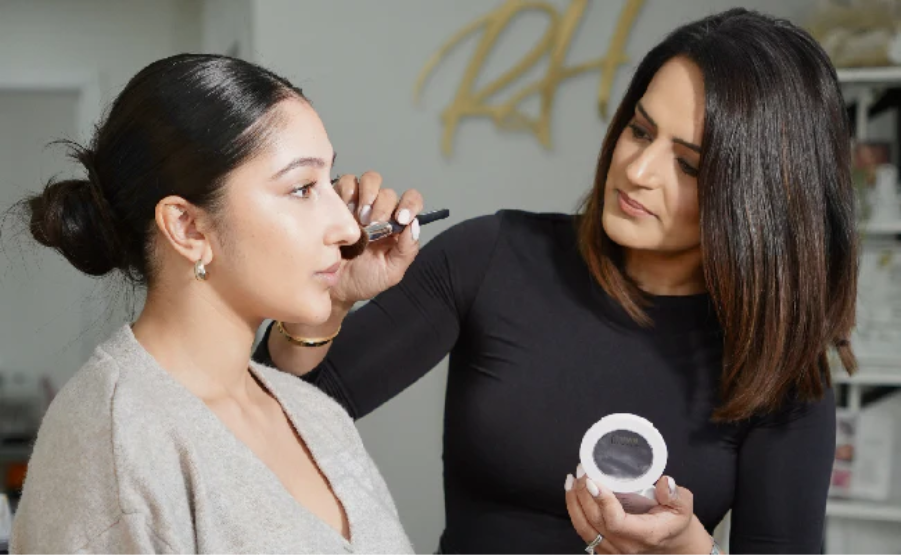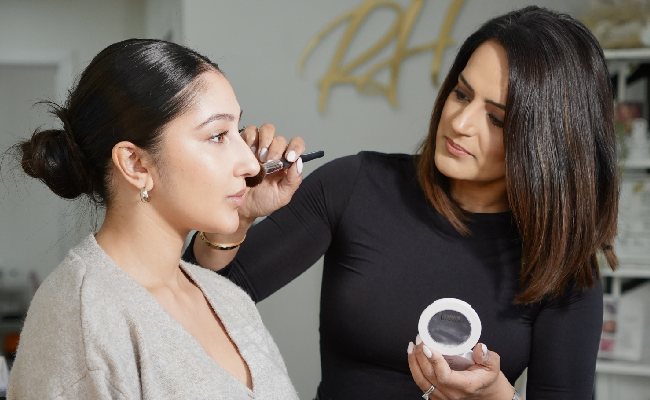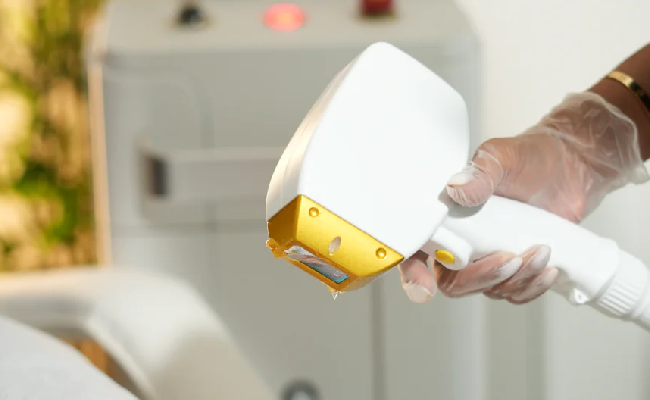
Becoming a Certified Makeup Artist: What Courses Are Offered at an Academy?
The beauty and fashion industry is experiencing massive growth, and the demand for skilled makeup artists is higher than ever before. From bridal events and red carpets to editorial shoots and films, makeup artistry has become one of the most sought-after professions across the globe. But the truth is, natural talent alone is no longer enough to thrive in this competitive field—you need formal training and certification to stand out.
Professional academies provide structured training, ensuring you not only learn artistry but also develop confidence, professionalism, and technical skills. At Raj Hothi Studio, students receive top-tier education designed to prepare them for every aspect of a makeup career. These programs transform a passion for beauty into a recognized profession, offering opportunities to work in diverse industries.
In this blog, we’ll explore the wide range of courses academies offer, the skills you’ll gain, and why certification can change your career. Each section is designed to answer key questions aspiring makeup artists often ask.
Why Should You Consider Becoming a Certified Makeup Artist?
Before enrolling in a program, it’s important to know why certification matters. Makeup artistry is an evolving industry, with clients expecting flawless results and industry professionals seeking proven expertise. Certification ensures you’re not just learning casually—you’re building a career with recognition and trust.
- Industry Credibility: Certification demonstrates that you’ve undergone professional training, making you more appealing to clients, salons, and agencies.
- Skill Development: Beyond creativity, courses teach technical precision, hygiene, and safety practices.
- Career Opportunities: Certification opens doors in bridal, fashion, film, television, and social media influencing.
- Networking Benefits: Training connects you with mentors, industry experts, and fellow artists who can shape your career.
- Higher Income Potential: Certified artists can charge premium rates compared to self-taught individuals.
For example, a certified bridal artist can charge three to four times more than someone without professional training, because clients trust expertise backed by credentials.
What Are the Different Types of Makeup Courses Available?
Makeup academies understand that no two students have the same goals. Some may dream of working backstage at fashion shows, while others want to specialize in bridal artistry. To cater to this, academies offer a variety of programs:
-
Basic Makeup Course
Perfect for beginners, covering skin preparation, foundation matching, blending techniques, and everyday makeup looks.
-
Bridal Makeup Course
Focused on creating timeless, long-lasting looks for weddings. Teaches durability, camera-friendly finishes, and cultural variations in bridal styles.
-
Professional Makeup Course
A full-fledged program covering multiple areas—bridal, editorial, high-fashion, and HD makeup. Often includes hairstyling basics and portfolio development.
-
Special Effects (SFX) Makeup Course
Designed for those passionate about film and theater, covering prosthetics, wounds, scars, and fantasy transformations.
-
Airbrush Makeup Course
Teaches precision with airbrush guns for high-definition photography and celebrity looks.
-
Hairstyling and Makeup Combo Courses
Ideal for those who want to offer complete makeover packages.
By choosing the right course, you align your learning with your career aspirations.
How Does a Makeup Academy Structure Its Training Programs?
Professional academies don’t just teach makeup—they create an environment where students are trained like working professionals. Every makeup academy structures its programs to ensure students are industry-ready.
-
Classroom Training
Covers theory such as skin types, undertones, hygiene, and color theory.
-
Hands-on Practice
Students practice on models and peers to gain real-time experience.
-
Workshops and Guest Lectures
International artists and industry experts are often invited to share insights.
-
Portfolio Development
Students create professional photo portfolios, crucial for job interviews and freelance gigs.
-
Examinations and Certification
Final assessments test both technical skill and creativity before awarding certification.
This structure ensures that graduates leave with knowledge, practical expertise, and confidence.
What Skills Do You Gain from Makeup Artist Courses?
Professional courses do more than teach how to apply makeup—they equip you with a complete toolkit of skills to succeed in the real world.
- Skin Analysis and Preparation: Learning to identify skin types, treat problem areas, and prep skin for flawless application.
- Color Theory and Matching: Understanding undertones, shade selection, and blending for natural results.
- Advanced Techniques: Includes cut-crease, smokey eyes, contouring, airbrushing, and HD makeup.
- Product and Tool Knowledge: Knowing when to use liquid vs. powder products, or synthetic vs. natural brushes.
- Hygiene and Safety: Maintaining sanitation standards, crucial for client trust.
- Professionalism: Soft skills like communication, punctuality, and handling client expectations.
For instance, an academy-trained artist not only knows how to match foundation shades but also how to make them last through an entire 10-hour wedding ceremony.
Who Can Enroll in Makeup Artist Courses?
The beauty of makeup education is that it welcomes everyone. Whether you’re a beginner or already working in the industry, academies provide learning opportunities for all.
- Beginners: Individuals with no prior experience who want to explore makeup as a career.
- Salon Professionals: Beauticians who want to upgrade their skills to include professional makeup services.
- Freelancers: Those planning to work independently for events or shoots.
- Fashion Enthusiasts: Creative individuals who want to work in fashion, runway, or editorial makeup.
- Career Switchers: Professionals from other industries who want to turn their passion into a full-time career.
How Long Do Makeup Courses Typically Last?
Course duration varies depending on the depth and intensity of training. This flexibility allows students to choose programs that fit their lifestyle and goals.
-
Short Courses (1–4 weeks)
Ideal for learning one skill set, like bridal makeup or party looks.
-
Intermediate Programs (2–3 months)
Cover a broader range of techniques, ideal for those planning to freelance.
-
Advanced Diplomas (6–12 months)
Comprehensive programs that include hairstyling, SFX, business training, and portfolio development.
Some academies also offer weekend or evening classes for working professionals, ensuring that education is accessible to everyone.
What Career Opportunities Open Up After Certification?
Certification is more than just a certificate—it’s a stepping stone to multiple career paths in the beauty industry.
- Freelance Makeup Artist: Build your brand and work with clients independently.
- Salon Makeup Artist: Join established salons and beauty studios.
- Bridal Specialist: A highly profitable niche with year-round demand.
- Fashion and Editorial Artist: Work with magazines, fashion shows, and designers.
- Film and Television Makeup Artist: Enter the entertainment industry for movies, ads, and series.
- Celebrity Makeup Artist: Work with influencers, actors, and public figures.
- Educator/Trainer: Share your knowledge by teaching others in academies or online.
For example, many academy graduates have gone on to become bridal specialists who earn six-figure incomes annually due to the booming wedding industry.
Why Is Hands-On Practice Crucial in Makeup Training?
Makeup is an art form that cannot be perfected by theory alone. Real-life practice shapes you into a confident artist.
- Builds Confidence: Working on real clients helps you tackle unique challenges like skin concerns or time limitations.
- Develops Speed: In weddings or shoots, you’ll often have limited time. Practice helps you work faster without compromising quality.
- Enhances Creativity: Trying different looks pushes your artistic boundaries.
- Error Correction: Trainers provide feedback during practice, helping you refine your technique.
Hands-on training ensures that by the time you graduate, you’re ready for real clients.
How Do You Choose the Right Academy for Makeup Training?
Selecting the right academy is crucial to your career success. Not all institutions offer the same level of expertise, so careful research is essential.
- Reputation and Reviews: Look for academies with strong alumni success stories.
- Course Variety: Ensure the academy provides beginner, advanced, and specialty courses.
- Trainers’ Expertise: Faculty should have real-world experience in fashion, film, or bridal makeup.
- Infrastructure and Tools: Modern classrooms with updated products and tools.
- Placement Assistance: Some academies provide internships, career guidance, or networking opportunities.
- Student Support: Check if they provide post-graduation support like portfolio building or workshops.
Remember, the right academy doesn’t just teach—it mentors you for long-term success.
Conclusion: Is Becoming a Certified Makeup Artist Worth It?
Makeup artistry is more than just a profession—it’s a career built on creativity, passion, and skill. With the right training, you can transform your love for makeup into a lucrative career that offers freedom, flexibility, and recognition. Certification ensures that you have the credibility and expertise to thrive in the competitive beauty industry.
At Raj Hothi Studio, students not only gain world-class education but also step into a community that supports their growth long after the course ends. Whether you dream of being a bridal specialist, a fashion artist, or a celebrity makeup professional, the right academy provides the foundation you need.
If you’re ready to take the next step, don’t wait—contact us today to begin your journey toward becoming a certified makeup artist.






